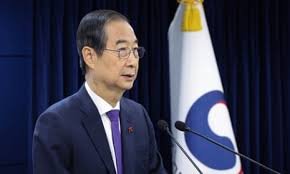
South Korea’s acting president, Prime Minister Han Duck-soo, is on the verge of an impeachment vote, which could further escalate the country’s ongoing political turmoil. The Constitutional Court is also preparing for its first hearing in the case of President Yoon Suk Yeol, who was impeached and suspended from office on December 14 after attempting to impose martial law, plunging the nation into a political crisis that has rattled both local markets and international allies.
Prime Minister Han has been serving as acting president since Yoon’s impeachment. His refusal to appoint three justices to fill vacancies at the Constitutional Court has sparked controversy, particularly among the opposition Democratic Party (DP), which announced on Thursday that it would pursue an impeachment vote against Han. The DP argues that Han’s decision to withhold appointments of the justices without bipartisan approval is an abuse of power and an attempt to obstruct the ongoing trial of President Yoon.
Initially, the DP had agreed not to pursue impeachment against Han in the interest of national stability, but tensions have since risen, especially after Han’s refusal to cooperate with proposed bills and the demand for special prosecutors to investigate Yoon’s controversial actions. The DP now accuses Han of complicity in Yoon’s alleged rebellion and has labeled him a “key suspect.”
The political standoff intensified after Yoon’s abrupt decree of martial law in early December, which aimed to resolve political deadlock and investigate alleged “anti-state forces.” The decree sent shockwaves through the country, with military forces deployed to key government offices, including the National Assembly and election commission. However, the martial law order was rescinded just hours later after lawmakers defied the troops and voted against it.
Yoon’s martial law move and subsequent impeachment have divided the country, with market reactions showing concerns about the stability of Asia’s fourth-largest economy. On Thursday, the South Korean won hit its lowest point since March 2009, as uncertainty surrounding the political situation compounded concerns over a rising U.S. dollar.
Meanwhile, the Constitutional Court is set to deliberate on whether Yoon should be reinstated or permanently removed from office. The court has 180 days to reach a decision, and if Yoon is permanently removed, a new presidential election would be called within 60 days. Yoon, who has refused to engage with the court proceedings, has remained defiant, while his legal team has yet to confirm any participation in the hearing.
Should Han be impeached, the South Korean finance minister would assume the acting presidency. However, there is significant disagreement within the country’s parliament about whether a simple majority or a two-thirds vote is required for the impeachment motion to succeed. The DP holds a majority in parliament, but the outcome remains uncertain.
In the event of Han’s impeachment, South Korea faces the prospect of yet another leadership crisis, as the country’s political factions remain at odds. As the constitutional and political battle rages on, South Korea’s political stability hangs in the balance, and the country’s international allies, including the United States and Europe, are watching closely.
Sources By Agencies


